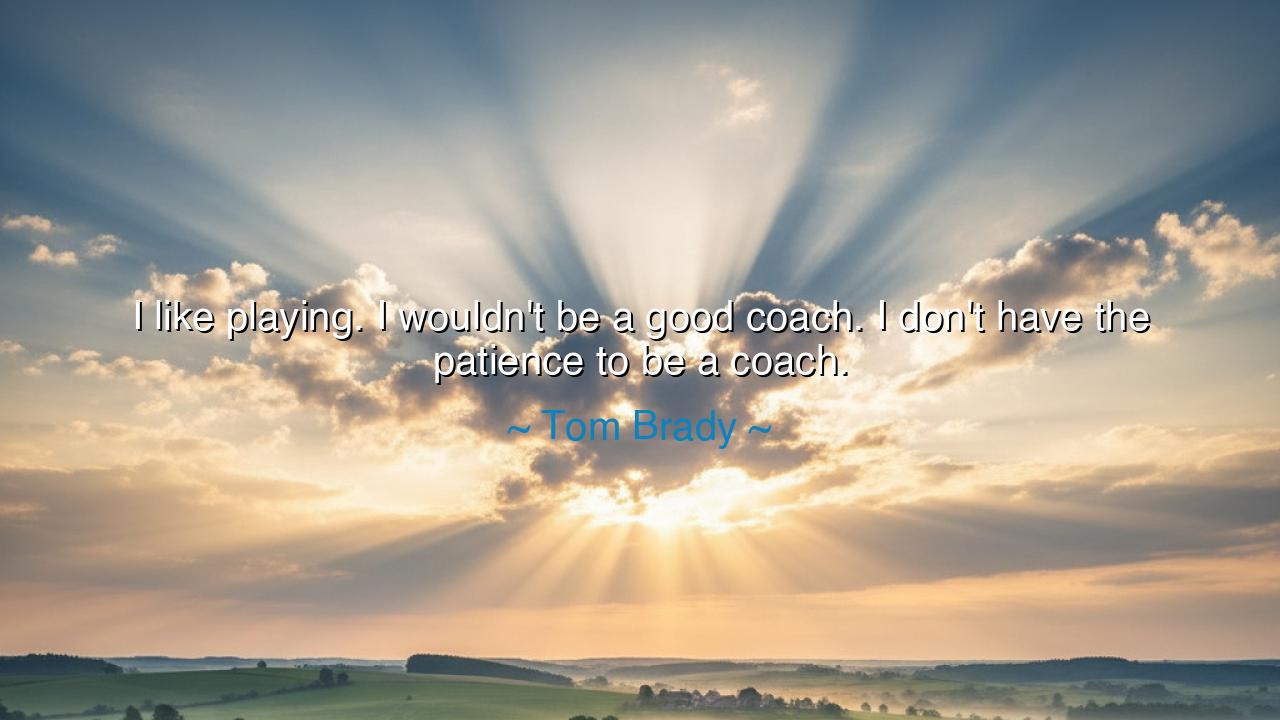
I like playing. I wouldn't be a good coach. I don't have the






Hear, O seekers of wisdom in the realm of sport and beyond, the words of Tom Brady, the warrior of the gridiron, who declared: “I like playing. I wouldn’t be a good coach. I don’t have the patience to be a coach.” These words, though humble and simple, contain within them a profound truth about the nature of calling, strength, and self-knowledge. For not every man is fashioned for every role, and the fire that drives one to excel in action may not be the same flame that sustains the long labor of guiding others.
Mark this well: Brady, a master of the field, confesseth that his gift is not in teaching but in doing. To play is to act, to seize the moment, to face the clash of bodies and the roar of the crowd. It demandeth courage, instinct, and swift decision. But to coach is another art entirely—it requireth the long discipline of patience, the ability to endure mistakes, to nurture slow growth, to watch others stumble until at last they stand. Thus, Brady, though mighty in battle, knew his spirit did not bend toward that slower, steadier path. His words are not weakness, but wisdom: the recognition of where his true strength lies.
Consider the tale of Alexander the Great. As a general, he was unmatched, conquering lands with brilliance and speed. Yet when asked to rule and govern, his fire faltered, for the skill of leading soldiers in battle is not the same as guiding nations in peace. Many heroes are mighty in the moment of action, yet lack the endurance for the quiet, patient labor of instruction. Brady’s confession echoes this eternal truth: not all who excel in the arena are destined to become teachers of it.
Yet let us not scorn the art of coaching, for it is noble in its own right. Think of John Wooden, the sage of basketball, who built champions not through his own play, but through endless hours of patient teaching. His greatness lay not in swift victories, but in shaping the character of countless young men. Where the player burneth bright for a season, the coach, with patience, becometh the gardener of many lives. Thus, both paths—the player’s and the coach’s—are honorable, but they demand different temperaments, different strengths.
The heart of Brady’s words remindeth us that self-knowledge is as vital as skill. To know what one is fit for, and what one is not, is the beginning of wisdom. Too many men stumble because they chase roles for which their soul is unsuited. The warrior may fail as a teacher; the teacher may falter as a warrior. But he who knoweth his calling, and walketh it with honesty, shall find both peace and greatness.
The lesson is clear: thou needest not wear every crown nor take on every mantle. If thy spirit burneth in action, then act with all thy might. If thy soul is tempered with patience, then guide others with wisdom. Envy not the path of another, nor force thyself into a role that is not thine. Instead, ask earnestly: “Where do my gifts lie? Where does my heart find joy?” For it is in that place that thou shalt serve best.
Practical is this counsel: discover thy calling not by imitation, but by truth. If thou art drawn to action, embrace it boldly. If thou art drawn to teaching, nurture it humbly. If thou findest that patience is not thy strength, then seek paths that demand other virtues. Honor the player for his courage, honor the coach for his patience, and honor thyself for walking the path that is thine alone.
Thus remember Tom Brady’s words: “I like playing… I don’t have the patience to be a coach.” In them is both honesty and freedom. For the greatest victory is not only to conquer others, but to know thyself. And the one who knoweth his gifts, and chooseth to walk in them, lives not in pretense, but in truth—and truth is the crown that endureth beyond all games, beyond all titles, into eternity.






AAdministratorAdministrator
Welcome, honored guests. Please leave a comment, we will respond soon